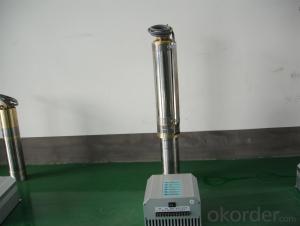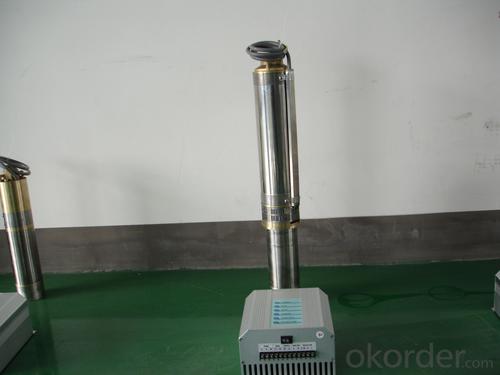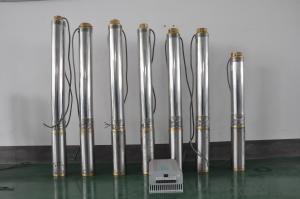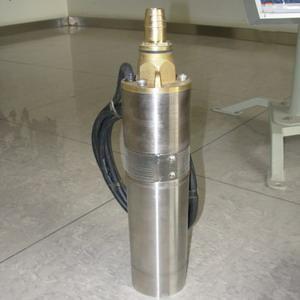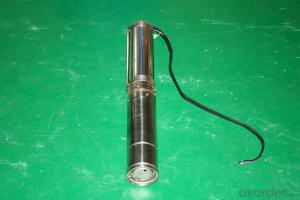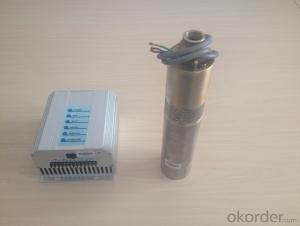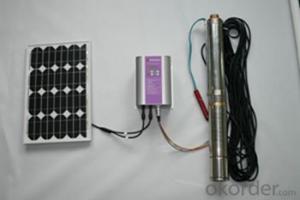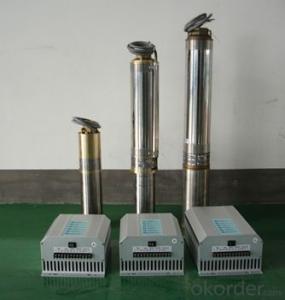Aisitin Solar Pump - Submersible Solar Pump
- Loading Port:
- China Main Port
- Payment Terms:
- TT OR LC
- Min Order Qty:
- -
- Supply Capability:
- -
OKorder Service Pledge
OKorder Financial Service
You Might Also Like
Item Description :
This superb new addition to our solar fountain range comes with a 10w solar panel,and a powerful fountain pump that is capable of producing fountains of up to 2m in height. As well as being easy to set up and use.Instruction manual is supplied for assembly and maintenance.
Solar Fountain Key Features :
Powered by direct sunlight
No high voltage electric mains required
Safe for children
Max. height of fountain: 2M
Max. flow capacity: 800 L/H(176 GAL)
10W Polycrystalline solar panel included
18V DC brushless pump
Solar Pump Features :
Can produce fountains up to : 2M (tube height) 1.4M (fountain height)
Comes with multiple nozzle accessories
Cable Length : 5M
Solar Panel Features :
10W peak power.
Polycrystalline highly efficient solar panel
Comes mounted in aluminium frame
Comes with ground stake and rotating knob so you can angle your panel toward the sun
What You Will Get :
10W solar panel
Solar pump
Ground Sake
Nozzle accessories
Precautions :
DO NOT alter or change the product itself or its components
Operate pump in freshwater only, never above 50 degrees celsius
Keep away from flammable liquids
Do not connect to any other power supply other than the included
- Q: Can a solar pump be used for landscape watering?
- Yes, a solar pump can be used for landscape watering. Solar pumps are designed to harness energy from the sun and convert it into power to pump water. This makes them an eco-friendly and cost-effective option for landscape watering. Solar pumps are capable of drawing water from various sources such as ponds, wells, or rainwater harvesting systems, and distributing it to the desired areas in your landscape. They can be used for both small-scale residential gardens or large-scale commercial landscapes. With the advancements in solar technology, solar pumps have become increasingly efficient and reliable, providing a sustainable solution for landscape watering while reducing the dependence on traditional electricity sources.
- Q: How does a solar pump handle water with high levels of bacteria or viruses?
- A solar pump itself does not have the capability to handle water with high levels of bacteria or viruses. However, in combination with other water purification methods such as filtration, chlorination, or UV treatment, a solar pump can help provide clean and safe water by pumping water from a contaminated source to a treatment system, effectively reducing the levels of bacteria or viruses for safe consumption.
- Q: Can a solar pump be used for swimming pools or fountains?
- Yes, a solar pump can definitely be used for swimming pools or fountains. Solar pumps are an environmentally-friendly alternative to traditional electric pumps as they harness the power of the sun to circulate water. They are particularly suitable for swimming pools and fountains because they are designed to handle the relatively low flow rates and water volumes typically associated with these applications. Additionally, solar pumps have the advantage of being independent of the electrical grid, making them a cost-effective and sustainable choice for pool and fountain owners. They are easy to install, require minimal maintenance, and can provide consistent and reliable water circulation without the need for excessive energy consumption.
- Q: How does the distance between the solar panel and the pump affect the performance?
- The distance between the solar panel and the pump can have a significant impact on the performance of the system. Firstly, the distance affects the efficiency of transferring power from the solar panel to the pump. As the distance increases, there is a higher chance of power loss due to resistance in the cables or wires used for transmission. This can result in a decrease in the amount of power reaching the pump, leading to reduced performance. Moreover, a longer distance between the solar panel and the pump can also lead to voltage drop issues. Voltage drop occurs when the resistance in the wires causes a decrease in voltage over a distance. This can further reduce the power reaching the pump, affecting its performance and potentially causing it to operate below its optimal power range. Additionally, the distance can impact the overall system design and installation. Longer distances may require more extensive wiring, which can increase costs and maintenance efforts. It can also introduce more points of potential failure in the system, such as connections or junctions, which may lead to performance issues. Finally, the distance between the solar panel and the pump can influence the system's reliability. If the solar panel is located far away from the pump, it may be exposed to different environmental conditions, such as shading or extreme temperatures, which can affect the overall performance and lifespan of the system. In summary, the distance between the solar panel and the pump can impact the efficiency of power transmission, lead to voltage drop issues, affect system design and installation, and influence the reliability of the system. Therefore, it is crucial to carefully consider and optimize the distance to ensure optimal performance and longevity of the solar-powered pump system.
- Q: What is the required maintenance schedule for a solar pump?
- The required maintenance schedule for a solar pump typically involves checking and cleaning the solar panels regularly to ensure they are free from dust or debris that could hamper their efficiency. Additionally, it is recommended to inspect the pump system, including its wiring, connections, and controller, periodically to identify any potential issues or damage.
- Q: Can a solar pump be used for water supply in farms or agricultural fields?
- Indeed, one can utilize a solar pump to facilitate water supply in farms or agricultural fields. Solar pumps present a cost-efficient and eco-friendly solution for nourishing crops and livestock. By harnessing solar energy to drive the pump, the reliance on electricity or fuel becomes obsolete. These pumps cater to a range of agricultural needs, including irrigation, livestock hydration, and general water distribution. Particularly in remote zones where grid electricity is either unavailable or exorbitantly priced, solar pumps prove to be a valuable asset. They demand minimal maintenance, boast reliability, and boast a lengthy lifespan, rendering them ideal for uninterrupted use in agricultural environments. Furthermore, solar pumps actively aid in diminishing carbon emissions and the dependence on fossil fuels, consequently contributing to a more sustainable and environmentally conscious agricultural sector.
- Q: Can a solar pump be used in cold climates?
- Yes, a solar pump can be used in cold climates. However, it is important to consider the specific design and capabilities of the solar pump being used. Some solar pumps are designed to withstand freezing temperatures and can continue to operate effectively even in cold climates. It is best to choose a solar pump specifically designed for cold weather conditions to ensure optimal performance and prevent any potential damage from freezing temperatures.
- Q: Can a solar pump be used for waterfalls and cascades in gardens?
- Yes, a solar pump can definitely be used for waterfalls and cascades in gardens. Solar pumps are a great eco-friendly option for powering water features in outdoor spaces. They are designed to be powered by the sun's energy, which means they do not require any external electricity source or wiring. Solar pumps are typically equipped with photovoltaic panels that convert sunlight into electrical energy, which is then used to power the pump. This makes them perfect for gardens and outdoor spaces where access to electrical outlets may be limited or impractical. Waterfalls and cascades can be beautifully enhanced with the use of a solar pump. These pumps are specifically designed to provide sufficient water flow and pressure to create stunning waterfall and cascade effects. They can be easily adjusted to control the height and flow of water, allowing you to create various water patterns and effects according to your preference. In addition to their convenience and versatility, solar pumps also have the benefit of being environmentally friendly. By using the sun's energy as a power source, they eliminate the need for traditional electricity and reduce carbon emissions. They also operate silently, allowing you to enjoy the peaceful ambiance of your garden without any noise pollution. Overall, if you are looking to add a waterfall or cascade feature to your garden, a solar pump is a fantastic option. It provides an eco-friendly and efficient way to power your water feature while adding a beautiful touch of nature to your outdoor space.
- Q: Can a solar pump be used in cold climates with freezing temperatures?
- Yes, a solar pump can be used in cold climates with freezing temperatures. However, precautions need to be taken to prevent freezing of the pump and its components. This can be achieved by using antifreeze solutions or insulating the pump and pipes to protect them from freezing.
- Q: Can a solar pump be used for industrial applications?
- Yes, a solar pump can be used for industrial applications. Solar pumps are increasingly being utilized in industries such as agriculture, water treatment, and manufacturing. They are reliable, cost-effective, and environmentally friendly alternatives to traditional pumps that rely on fossil fuels or grid electricity.
Send your message to us
Aisitin Solar Pump - Submersible Solar Pump
- Loading Port:
- China Main Port
- Payment Terms:
- TT OR LC
- Min Order Qty:
- -
- Supply Capability:
- -
OKorder Service Pledge
OKorder Financial Service
Similar products
Hot products
Hot Searches
Related keywords
